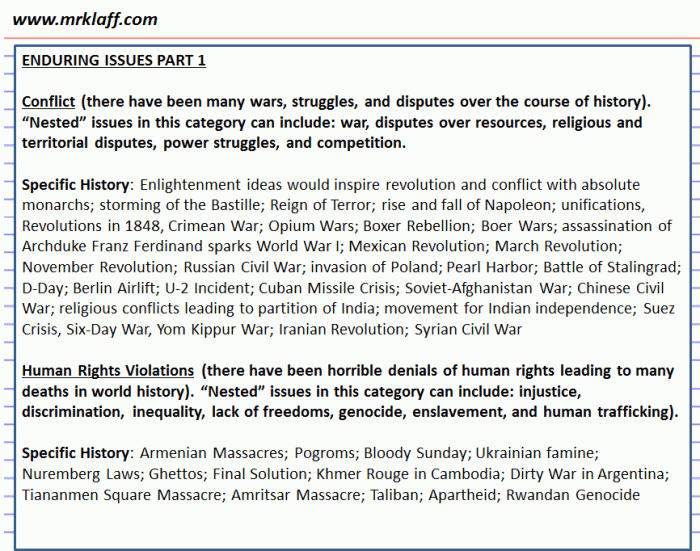Global history regents enduring issues essay – In the tapestry of global history, certain enduring issues have woven their threads through the fabric of time, shaping civilizations, igniting conflicts, and leaving an indelible mark on the human experience. This essay delves into the concept of enduring issues in global history, examining their significance, methods of analysis, and contemporary relevance.
These enduring issues have served as catalysts for historical events, influenced the rise and fall of empires, and continue to resonate in contemporary societies. Understanding their multifaceted nature is crucial for gaining a deeper comprehension of the complexities of human history.
Historical Significance of Enduring Issues

Enduring issues are historical phenomena that have persisted over time and continue to impact societies today. These issues transcend specific historical periods or geographical boundaries, shaping global events and influencing human experiences. By studying enduring issues, historians gain insights into the fundamental challenges and opportunities that have shaped human history.
Examples of enduring issues include: the quest for power, the struggle for equality, the search for meaning, and the impact of technology. These issues have been present in human societies for centuries, and they continue to shape contemporary events. For instance, the quest for power has driven conflicts and shaped political systems throughout history, while the struggle for equality has led to social movements and revolutions aimed at achieving justice and equity.
Enduring issues can be interpreted from different perspectives, reflecting the diverse experiences and values of different societies. Historians may approach these issues through the lens of political, economic, social, or cultural history, each perspective offering unique insights into the causes and consequences of enduring issues.
Methods of Analyzing Enduring Issues
Historians use various methods to analyze enduring issues in global history. These methods include:
- Comparative analysis: Comparing different societies and historical periods to identify similarities and differences in how enduring issues have been addressed.
- Contextual analysis: Examining enduring issues within their specific historical and cultural contexts to understand the factors that have shaped their development.
- Source analysis: Critically evaluating primary and secondary sources to extract evidence and insights about enduring issues.
- Theoretical analysis: Applying historical theories and concepts to explain the causes and consequences of enduring issues.
Each method has its strengths and limitations. Comparative analysis allows for broad generalizations but may overlook specific nuances. Contextual analysis provides depth but may be limited by the availability of sources. Source analysis provides concrete evidence but requires careful interpretation.
Theoretical analysis offers power but may be overly abstract.
Enduring Issues in Global History: Global History Regents Enduring Issues Essay
| Enduring Issue | Historical Context | Impact on Global History | Examples |
|---|---|---|---|
| Quest for Power | Political and military conflicts | Shaped political systems, led to wars and conquests | Alexander the Great’s conquests, Roman Empire, World War II |
| Struggle for Equality | Social and economic inequalities | Social movements, revolutions, legal reforms | Civil rights movement, French Revolution, women’s suffrage |
| Search for Meaning | Philosophical and religious beliefs | Cultural and intellectual development, formation of societies | Buddhism, Christianity, Enlightenment |
| Impact of Technology | Technological advancements | Economic growth, social change, environmental impact | Industrial Revolution, internet, artificial intelligence |
Historiography of Enduring Issues
The historiography of enduring issues has evolved over time, reflecting changing perspectives and interpretations. Early historians focused on political and military aspects of history, but later historians began to incorporate social, economic, and cultural factors into their analysis.
Different schools of thought have influenced the interpretation of enduring issues. Marxist historians have emphasized the role of class struggle in shaping history, while feminist historians have highlighted the experiences of women and gender inequalities. Postcolonial historians have explored the impact of colonialism and imperialism on enduring issues.
Primary and secondary sources reflect the changing historiographical perspectives on enduring issues. Primary sources, such as letters, diaries, and government documents, provide firsthand accounts of historical events and can be used to challenge or support different interpretations.
Contemporary Relevance of Enduring Issues

Enduring issues continue to shape contemporary societies and understanding them is essential for informed decision-making. For instance, the quest for power remains a driving force in international relations, while the struggle for equality continues to inspire social movements and legal reforms.
By studying enduring issues, we can learn from the past and gain insights into the challenges and opportunities facing humanity today. This knowledge can help us make more informed decisions and work towards creating a more just and equitable world.
Commonly Asked Questions
What is the significance of enduring issues in global history?
Enduring issues provide a framework for understanding the recurring patterns and challenges that have shaped human history, allowing us to identify commonalities and differences across cultures and time periods.
How do historians analyze enduring issues?
Historians employ a variety of methods to analyze enduring issues, including comparative analysis, thematic studies, and historiographical research. They utilize primary and secondary sources to gain diverse perspectives and construct well-rounded interpretations.
How are enduring issues relevant to contemporary society?
Enduring issues continue to manifest in modern times, influencing global events and shaping contemporary societies. Understanding their historical roots provides valuable insights for addressing current challenges and fostering a more just and equitable world.